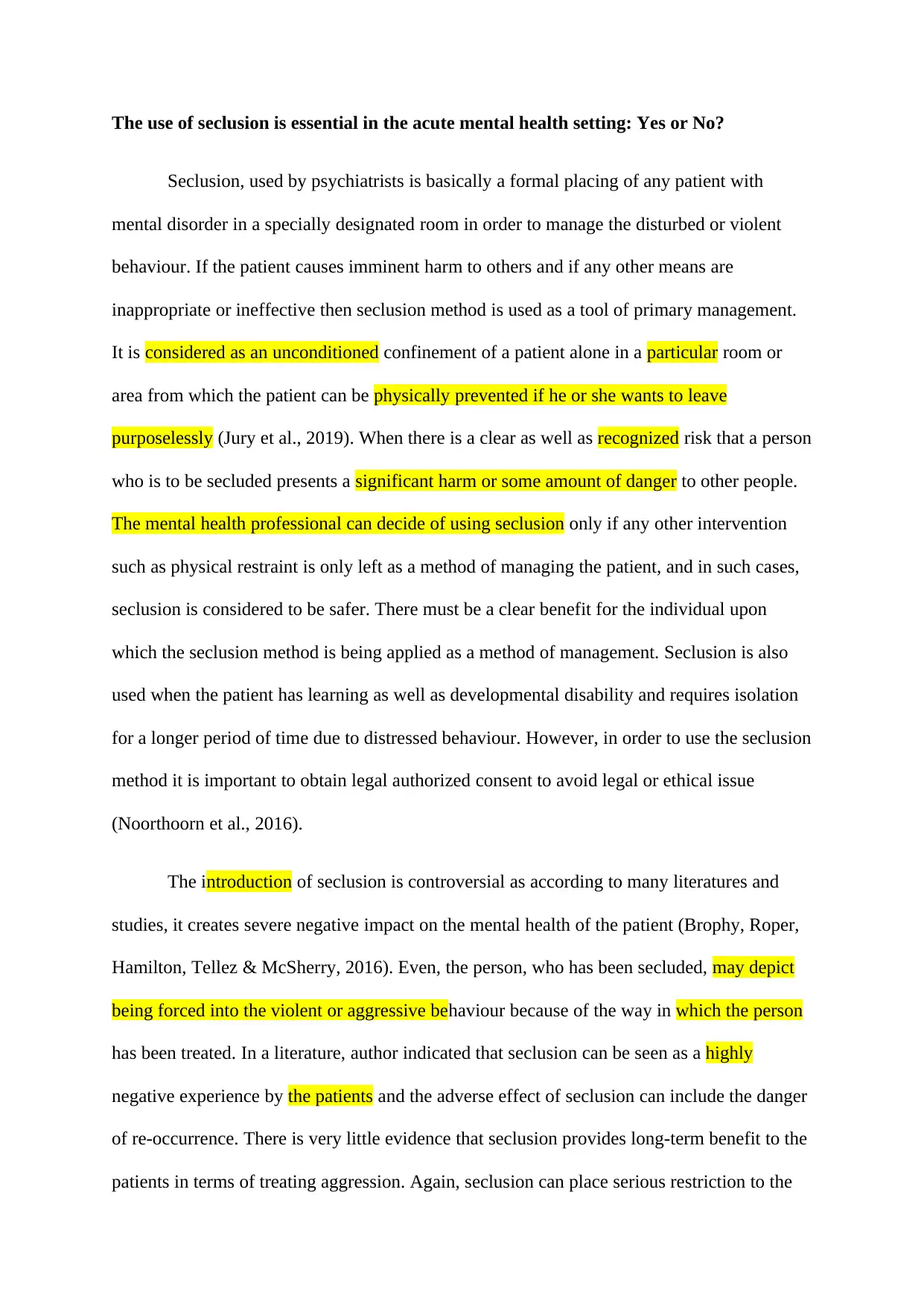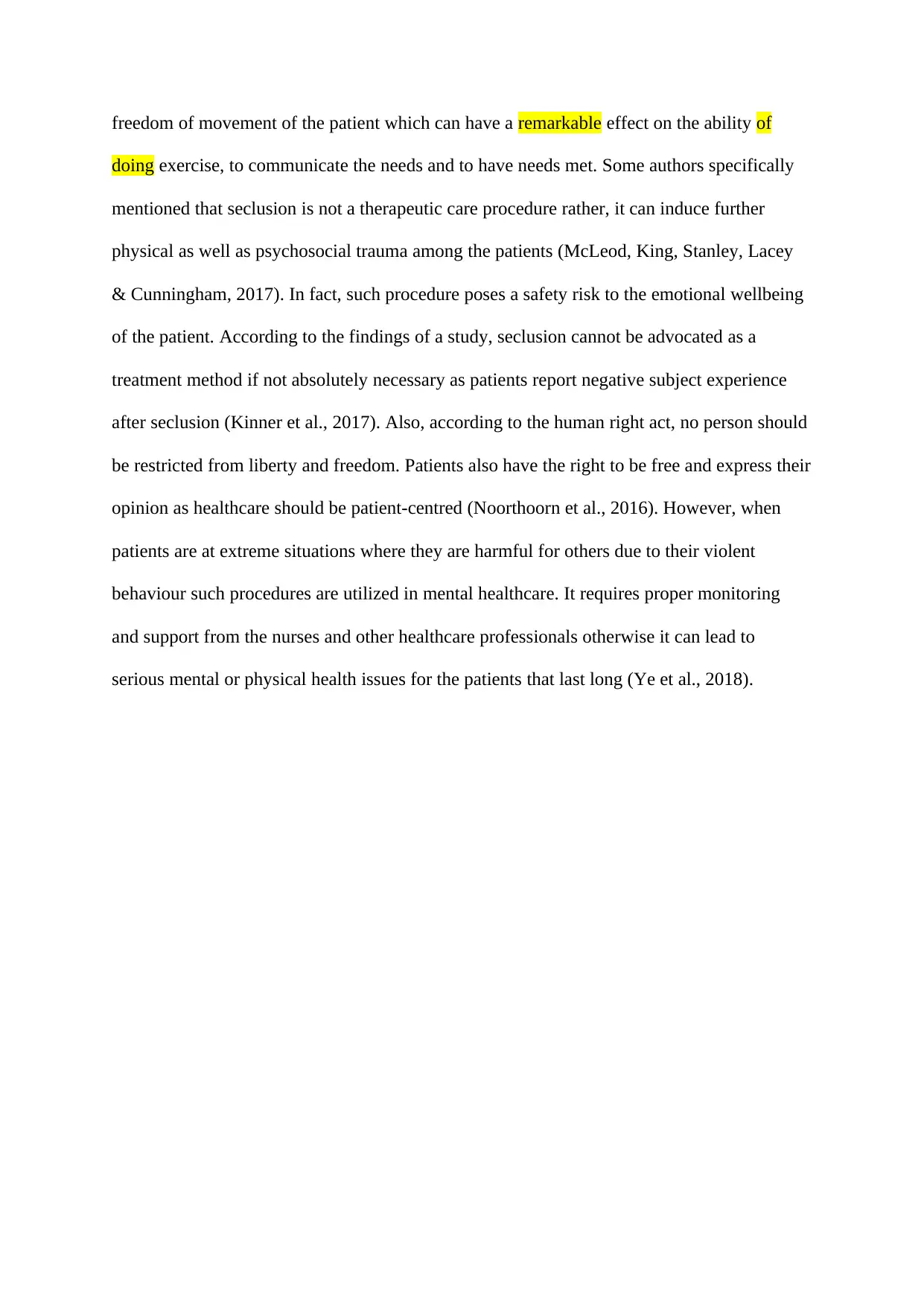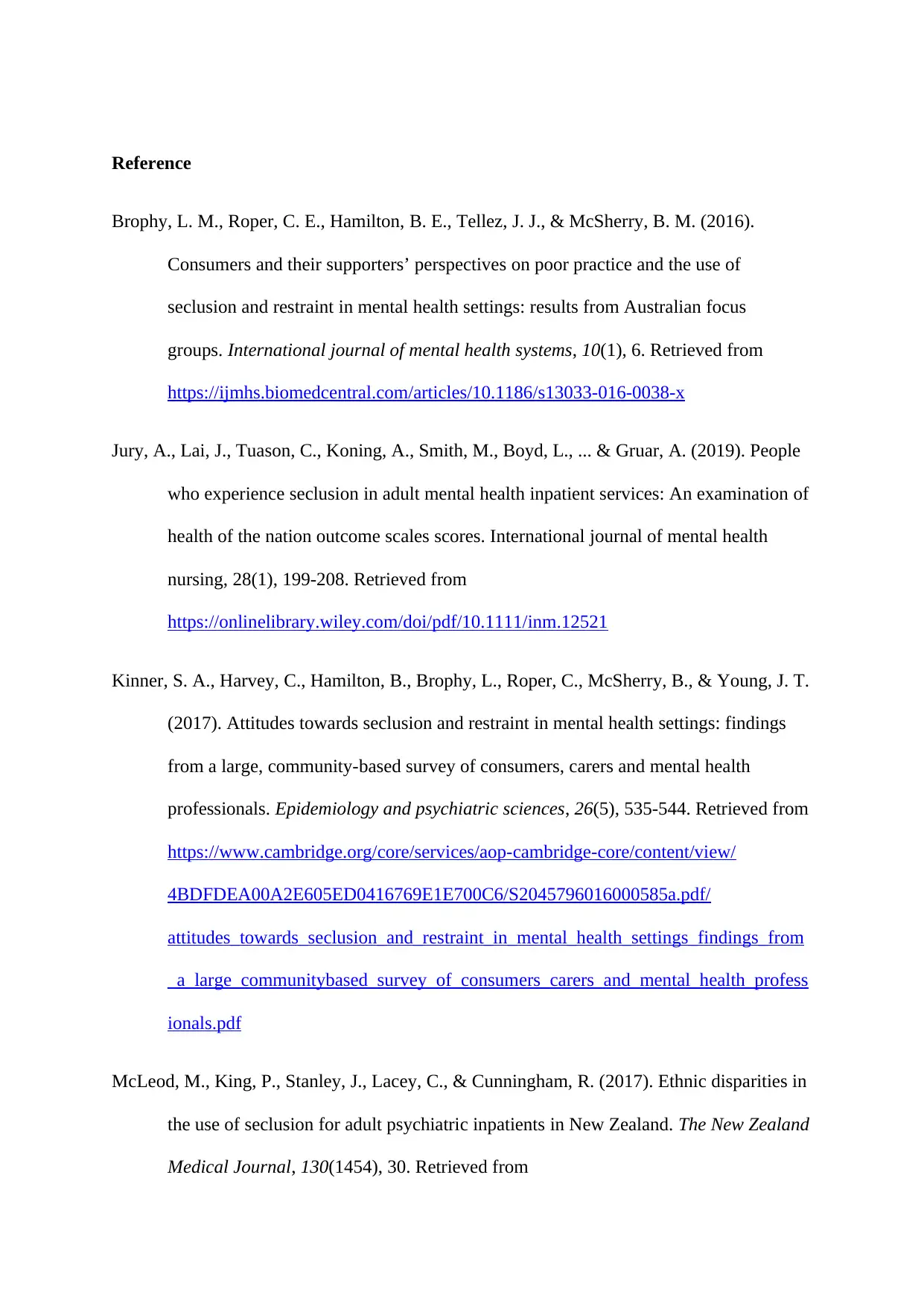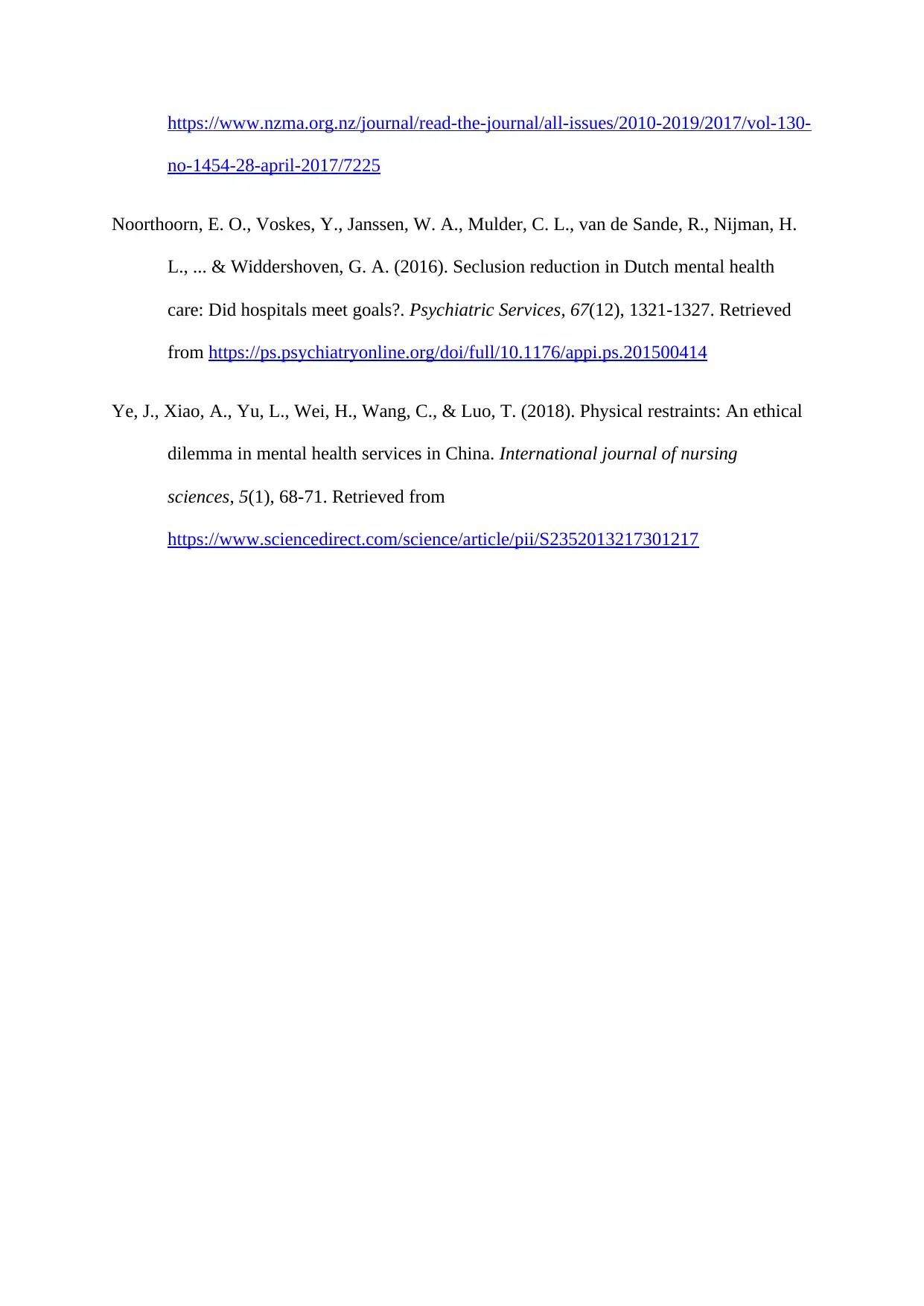The Use of Seclusion in Acute Mental Health: A Debate (NRS83004)
VerifiedAdded on 2023/01/06
|4
|1055
|94
Discussion Board Post
AI Summary
This assignment addresses the controversial use of seclusion in acute mental health settings. The student explores the arguments for and against seclusion, a practice involving the confinement of patients with mental disorders to manage disturbed or violent behavior. The assignment highlights the legal and ethical considerations, referencing literature that discusses both the potential benefits and significant negative impacts of seclusion on patient mental health. It examines concerns about patient rights, the potential for trauma, and the limited evidence supporting long-term benefits. The student considers alternative interventions and the importance of patient-centered care. The assignment emphasizes the need for careful monitoring, support from healthcare professionals, and adherence to human rights principles when seclusion is employed.

The use of seclusion is essential in the acute mental health setting: Yes or No?
Seclusion, used by psychiatrists is basically a formal placing of any patient with
mental disorder in a specially designated room in order to manage the disturbed or violent
behaviour. If the patient causes imminent harm to others and if any other means are
inappropriate or ineffective then seclusion method is used as a tool of primary management.
It is considered as an unconditioned confinement of a patient alone in a particular room or
area from which the patient can be physically prevented if he or she wants to leave
purposelessly (Jury et al., 2019). When there is a clear as well as recognized risk that a person
who is to be secluded presents a significant harm or some amount of danger to other people.
The mental health professional can decide of using seclusion only if any other intervention
such as physical restraint is only left as a method of managing the patient, and in such cases,
seclusion is considered to be safer. There must be a clear benefit for the individual upon
which the seclusion method is being applied as a method of management. Seclusion is also
used when the patient has learning as well as developmental disability and requires isolation
for a longer period of time due to distressed behaviour. However, in order to use the seclusion
method it is important to obtain legal authorized consent to avoid legal or ethical issue
(Noorthoorn et al., 2016).
The introduction of seclusion is controversial as according to many literatures and
studies, it creates severe negative impact on the mental health of the patient (Brophy, Roper,
Hamilton, Tellez & McSherry, 2016). Even, the person, who has been secluded, may depict
being forced into the violent or aggressive behaviour because of the way in which the person
has been treated. In a literature, author indicated that seclusion can be seen as a highly
negative experience by the patients and the adverse effect of seclusion can include the danger
of re-occurrence. There is very little evidence that seclusion provides long-term benefit to the
patients in terms of treating aggression. Again, seclusion can place serious restriction to the
Seclusion, used by psychiatrists is basically a formal placing of any patient with
mental disorder in a specially designated room in order to manage the disturbed or violent
behaviour. If the patient causes imminent harm to others and if any other means are
inappropriate or ineffective then seclusion method is used as a tool of primary management.
It is considered as an unconditioned confinement of a patient alone in a particular room or
area from which the patient can be physically prevented if he or she wants to leave
purposelessly (Jury et al., 2019). When there is a clear as well as recognized risk that a person
who is to be secluded presents a significant harm or some amount of danger to other people.
The mental health professional can decide of using seclusion only if any other intervention
such as physical restraint is only left as a method of managing the patient, and in such cases,
seclusion is considered to be safer. There must be a clear benefit for the individual upon
which the seclusion method is being applied as a method of management. Seclusion is also
used when the patient has learning as well as developmental disability and requires isolation
for a longer period of time due to distressed behaviour. However, in order to use the seclusion
method it is important to obtain legal authorized consent to avoid legal or ethical issue
(Noorthoorn et al., 2016).
The introduction of seclusion is controversial as according to many literatures and
studies, it creates severe negative impact on the mental health of the patient (Brophy, Roper,
Hamilton, Tellez & McSherry, 2016). Even, the person, who has been secluded, may depict
being forced into the violent or aggressive behaviour because of the way in which the person
has been treated. In a literature, author indicated that seclusion can be seen as a highly
negative experience by the patients and the adverse effect of seclusion can include the danger
of re-occurrence. There is very little evidence that seclusion provides long-term benefit to the
patients in terms of treating aggression. Again, seclusion can place serious restriction to the
Paraphrase This Document
Need a fresh take? Get an instant paraphrase of this document with our AI Paraphraser

freedom of movement of the patient which can have a remarkable effect on the ability of
doing exercise, to communicate the needs and to have needs met. Some authors specifically
mentioned that seclusion is not a therapeutic care procedure rather, it can induce further
physical as well as psychosocial trauma among the patients (McLeod, King, Stanley, Lacey
& Cunningham, 2017). In fact, such procedure poses a safety risk to the emotional wellbeing
of the patient. According to the findings of a study, seclusion cannot be advocated as a
treatment method if not absolutely necessary as patients report negative subject experience
after seclusion (Kinner et al., 2017). Also, according to the human right act, no person should
be restricted from liberty and freedom. Patients also have the right to be free and express their
opinion as healthcare should be patient-centred (Noorthoorn et al., 2016). However, when
patients are at extreme situations where they are harmful for others due to their violent
behaviour such procedures are utilized in mental healthcare. It requires proper monitoring
and support from the nurses and other healthcare professionals otherwise it can lead to
serious mental or physical health issues for the patients that last long (Ye et al., 2018).
doing exercise, to communicate the needs and to have needs met. Some authors specifically
mentioned that seclusion is not a therapeutic care procedure rather, it can induce further
physical as well as psychosocial trauma among the patients (McLeod, King, Stanley, Lacey
& Cunningham, 2017). In fact, such procedure poses a safety risk to the emotional wellbeing
of the patient. According to the findings of a study, seclusion cannot be advocated as a
treatment method if not absolutely necessary as patients report negative subject experience
after seclusion (Kinner et al., 2017). Also, according to the human right act, no person should
be restricted from liberty and freedom. Patients also have the right to be free and express their
opinion as healthcare should be patient-centred (Noorthoorn et al., 2016). However, when
patients are at extreme situations where they are harmful for others due to their violent
behaviour such procedures are utilized in mental healthcare. It requires proper monitoring
and support from the nurses and other healthcare professionals otherwise it can lead to
serious mental or physical health issues for the patients that last long (Ye et al., 2018).

Reference
Brophy, L. M., Roper, C. E., Hamilton, B. E., Tellez, J. J., & McSherry, B. M. (2016).
Consumers and their supporters’ perspectives on poor practice and the use of
seclusion and restraint in mental health settings: results from Australian focus
groups. International journal of mental health systems, 10(1), 6. Retrieved from
https://ijmhs.biomedcentral.com/articles/10.1186/s13033-016-0038-x
Jury, A., Lai, J., Tuason, C., Koning, A., Smith, M., Boyd, L., ... & Gruar, A. (2019). People
who experience seclusion in adult mental health inpatient services: An examination of
health of the nation outcome scales scores. International journal of mental health
nursing, 28(1), 199-208. Retrieved from
https://onlinelibrary.wiley.com/doi/pdf/10.1111/inm.12521
Kinner, S. A., Harvey, C., Hamilton, B., Brophy, L., Roper, C., McSherry, B., & Young, J. T.
(2017). Attitudes towards seclusion and restraint in mental health settings: findings
from a large, community-based survey of consumers, carers and mental health
professionals. Epidemiology and psychiatric sciences, 26(5), 535-544. Retrieved from
https://www.cambridge.org/core/services/aop-cambridge-core/content/view/
4BDFDEA00A2E605ED0416769E1E700C6/S2045796016000585a.pdf/
attitudes_towards_seclusion_and_restraint_in_mental_health_settings_findings_from
_a_large_communitybased_survey_of_consumers_carers_and_mental_health_profess
ionals.pdf
McLeod, M., King, P., Stanley, J., Lacey, C., & Cunningham, R. (2017). Ethnic disparities in
the use of seclusion for adult psychiatric inpatients in New Zealand. The New Zealand
Medical Journal, 130(1454), 30. Retrieved from
Brophy, L. M., Roper, C. E., Hamilton, B. E., Tellez, J. J., & McSherry, B. M. (2016).
Consumers and their supporters’ perspectives on poor practice and the use of
seclusion and restraint in mental health settings: results from Australian focus
groups. International journal of mental health systems, 10(1), 6. Retrieved from
https://ijmhs.biomedcentral.com/articles/10.1186/s13033-016-0038-x
Jury, A., Lai, J., Tuason, C., Koning, A., Smith, M., Boyd, L., ... & Gruar, A. (2019). People
who experience seclusion in adult mental health inpatient services: An examination of
health of the nation outcome scales scores. International journal of mental health
nursing, 28(1), 199-208. Retrieved from
https://onlinelibrary.wiley.com/doi/pdf/10.1111/inm.12521
Kinner, S. A., Harvey, C., Hamilton, B., Brophy, L., Roper, C., McSherry, B., & Young, J. T.
(2017). Attitudes towards seclusion and restraint in mental health settings: findings
from a large, community-based survey of consumers, carers and mental health
professionals. Epidemiology and psychiatric sciences, 26(5), 535-544. Retrieved from
https://www.cambridge.org/core/services/aop-cambridge-core/content/view/
4BDFDEA00A2E605ED0416769E1E700C6/S2045796016000585a.pdf/
attitudes_towards_seclusion_and_restraint_in_mental_health_settings_findings_from
_a_large_communitybased_survey_of_consumers_carers_and_mental_health_profess
ionals.pdf
McLeod, M., King, P., Stanley, J., Lacey, C., & Cunningham, R. (2017). Ethnic disparities in
the use of seclusion for adult psychiatric inpatients in New Zealand. The New Zealand
Medical Journal, 130(1454), 30. Retrieved from
⊘ This is a preview!⊘
Do you want full access?
Subscribe today to unlock all pages.

Trusted by 1+ million students worldwide

https://www.nzma.org.nz/journal/read-the-journal/all-issues/2010-2019/2017/vol-130-
no-1454-28-april-2017/7225
Noorthoorn, E. O., Voskes, Y., Janssen, W. A., Mulder, C. L., van de Sande, R., Nijman, H.
L., ... & Widdershoven, G. A. (2016). Seclusion reduction in Dutch mental health
care: Did hospitals meet goals?. Psychiatric Services, 67(12), 1321-1327. Retrieved
from https://ps.psychiatryonline.org/doi/full/10.1176/appi.ps.201500414
Ye, J., Xiao, A., Yu, L., Wei, H., Wang, C., & Luo, T. (2018). Physical restraints: An ethical
dilemma in mental health services in China. International journal of nursing
sciences, 5(1), 68-71. Retrieved from
https://www.sciencedirect.com/science/article/pii/S2352013217301217
no-1454-28-april-2017/7225
Noorthoorn, E. O., Voskes, Y., Janssen, W. A., Mulder, C. L., van de Sande, R., Nijman, H.
L., ... & Widdershoven, G. A. (2016). Seclusion reduction in Dutch mental health
care: Did hospitals meet goals?. Psychiatric Services, 67(12), 1321-1327. Retrieved
from https://ps.psychiatryonline.org/doi/full/10.1176/appi.ps.201500414
Ye, J., Xiao, A., Yu, L., Wei, H., Wang, C., & Luo, T. (2018). Physical restraints: An ethical
dilemma in mental health services in China. International journal of nursing
sciences, 5(1), 68-71. Retrieved from
https://www.sciencedirect.com/science/article/pii/S2352013217301217
1 out of 4
Related Documents
Your All-in-One AI-Powered Toolkit for Academic Success.
+13062052269
info@desklib.com
Available 24*7 on WhatsApp / Email
![[object Object]](/_next/static/media/star-bottom.7253800d.svg)
Unlock your academic potential
Copyright © 2020–2026 A2Z Services. All Rights Reserved. Developed and managed by ZUCOL.





